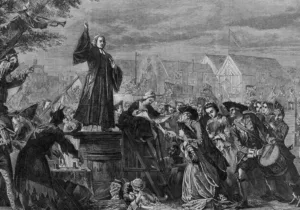In a recent Washington Post column Max Boot hoped America one day would have an “unapologetic atheist” president. After all, religious people are often hypocrites, evils are committed under religion’s cover, and morality can endure without God.
Boot wrote:
Most of China’s 1.4 billion people have no religious affiliation, and fewer than 7 percent are monotheists. Is there any reason to believe that China is a less moral place than the United States, where 70.6 percent profess to be Christians? Or that Europeans act worse than Americans because only 27 percent of them believe in the God described in the Bible, compared with 56 percent of Americans? In fact, by many measures, such as crime rates and social welfare, Europe is actually a more moral place.
As to whether China is less moral than America, maybe the hundreds of thousands of interned Muslims in western China undergoing religious deprogramming might answer that question differently than Boot. Christians whose churches have been smashed would also have interesting answers, as would thousands of political prisoners. So too would millions of Chinese women forced to have abortions under the One Child policy.
China’s current regime, in earlier decades under its founder Mao, murdered and starved to death tens of millions in pursuit of a godless utopia. Today the regime still honors one of history’s most murderous tyrants.
As to secular Europe’s moral superiority, what was once known as Christendom still operates on the fumes of a civilization in which God and church were central. Would the liberal democratic values Boot rightly esteems have emerged without that religious foundation? If so, other cultures did not replicate it. And secular Europe today hardly inspires great confidence about its demographic, political and cultural future, as Boot knows.
Boot cited Churchill as a great leader who showed “how righteously a nonbeliever can act.” After all, “If atheism was good enough for Britain’s greatest prime minister, it should be good enough for a U.S. president.”
If Churchill was atheist, he was well disguised, hailing “Christian civilization” and citing scripture, comparing himself to a flying buttress who supported the church from the outside. The funeral he organized for himself was the Church of England at its best, for which he promised “lively hymns,” which were “O God Our Help in Ages Past,” “Fight the Good Fight with All Thy Might,” “Who Would True Valour See,” and “The Battle Hymn of the Republic,” sometimes said to be Churchill’s special favorite.
Whatever was in Churchill’s private conscience, he thought, spoke and acted in the cadence of biblical religion, which included his commitment to Zionism and the welfare of Jewish people. Politicos and cultures that secularized more often lack that level of commitment.
If America secularized on par with Europe, would the result be congenial to historic American democratic principles? And would an atheist president effectively articulate them in ways strengthening democracy at home and promoting it with American interests abroad? Doing so might be challenging when America’s Founders and charter documents rested their assertions of intrinsic human rights on a Creator.
All American presidents, whatever their personal beliefs, have echoed this language of civil religion in support of democratic principles. If a president rejects this 250 year old tradition, what rhetorical replacement would follow? The Founders and Declaration of Independence were wrong to premise their clams to ordered liberty on God, so the alternative is???
Secularists often imagine they ride astride history. But demographically the world’s most secular precincts are shrinking while most of the world remains or becomes more religious. To what extent could a self-identified “unapologetic atheist” American president speak effectively to most of the world if he or she adamantly rejects what is central to most people in most cultures?
“Whether you believe or disbelieve, it is a wretched thing to take away Man’s hope,” Churchill once commented privately. America is influential politically in the world not only because of wealth and might but because it espouses a politics of hope in which each person has God given rights, liberty and dignity.
Could an “unapologetic atheist” American president who rejects this premise effectively represent America to the world? The question requires more answer than Boot offered in his Post column.







 Sponsor a student for Christianity & National Security 2024
Sponsor a student for Christianity & National Security 2024